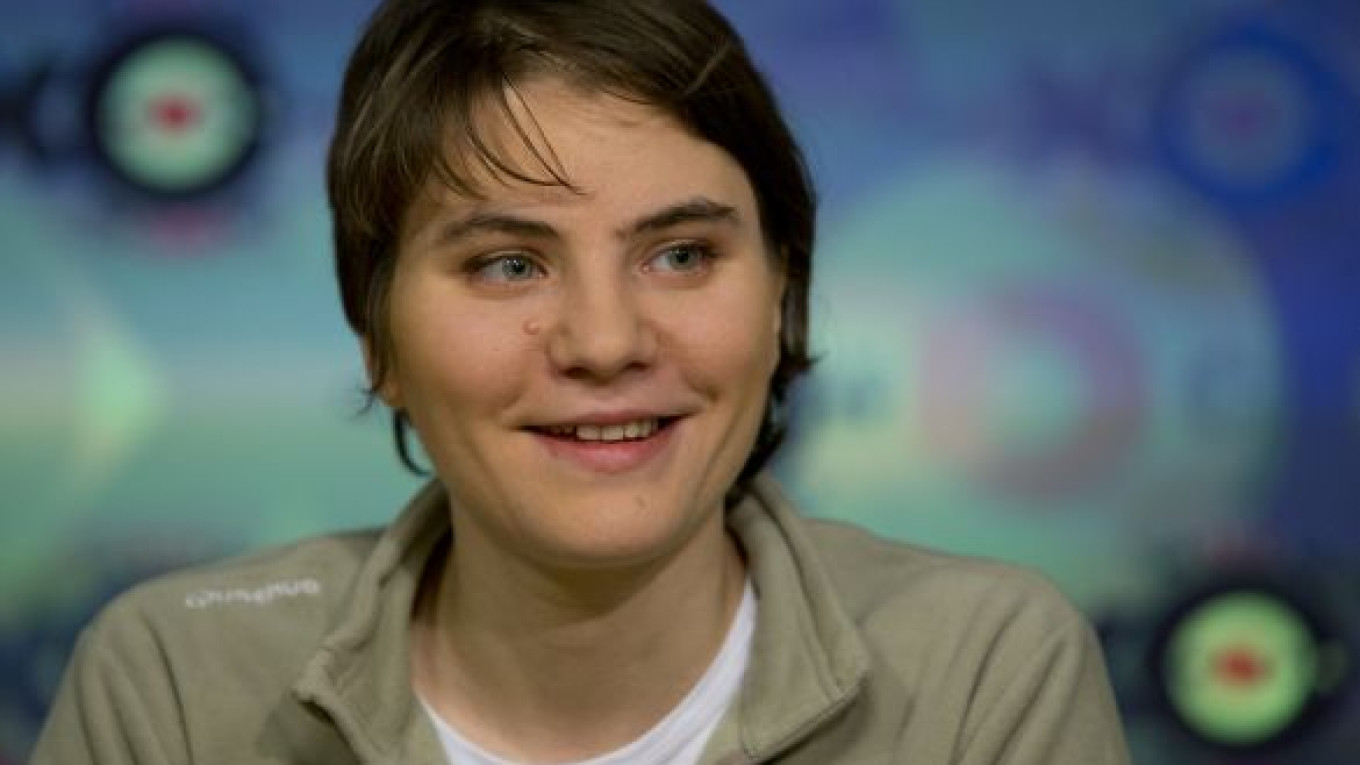Pussy Riot angered President Vladimir Putin and the dominant Russian Orthodox Church but succeeded in highlighting the close ties that bind church, state and the courts together in Putin's Russia, a freed member of the punk band said on Saturday.
"We achieved more than our goal," Yekaterina Samutsevich said in an interview.
Samutsevich, 30, walked free after more than six months in jail when an appeals court suspended her two-year sentence on Wednesday. Two band mates were sent back behind bars to serve out their terms and could be sent to prison in Siberia.
Samutsevich, Maria Alyokhina, 24, and Nadezhda Tolokonnikova, 22, were convicted in August for a profanity-laced "punk prayer" in Moscow's main cathedral asking the Virgin Mary to "cast Putin out."
The protest prompted accusations of blasphemy from the Orthodox Church and acerbic criticism from Putin. Their trial got Russians talking about the intertwining of church and state and the politically engaged courts.
"People who even never thought about these things started to talk about them, to read and to listen to other people's opinions," Samutsevich said in the interview at a kitchen table in a friend's apartment in Moscow.
"A discussion has begun in society, and that is very important for us," she said.
The women's case sparked global outcry with Western governments and pop stars including Madonna condemning their sentences as disproportionate and Russia saying such criticism pointed to a "clash of civilizations."
The trio were found guilty of "hooliganism motivated by religious hatred" — a ruling Samutsevich said was grossly misguided and unlawful: "We are not hooligans and didn't want to insult anyone."
She said the prank was meant to draw attention to close ties between the Russian Orthodox Church and the government, which Pussy Riot says is giving the church growing power over society in what the constitution says is a secular state.
Before the "punk prayer" in Moscow's Christ the Savior Cathedral, Russian Orthodox Patriarch Kirill gave Putin, then prime minister, support in his campaign for a third presidential term, likening his years in power to a "miracle of God."
The trial "showed how the courts are subverted to the authorities, controlled in essence by the opinions of a few people at the pinnacle of power," Samutsevich said. "The whole world can see this. It cannot be hidden, whatever Putin says."
"I am certain that many people in Russia have changed their opinion about Putin's regime," she said. "It is great that our case has had this effect, has made people think about this."
Sympathy for the group is limited in Russia, however. An opinion poll conducted last month by the independent Levada Center found that 35 percent of Russians believe the two-year sentences were appropriate, while 34 percent said they were too lenient and only 14 percent said they were excessive.
The Kremlin-controlled parliament is considering legislation to toughen punishment for offending religious sentiment, part of what Kremlin critics say is a clamp-down on dissent since Putin started a six-year term in May.
Putin supported the sentences, saying the trial court "was right to make this decision because you cannot undermine the fundamental morals and values to destroy the country."
Samutsevich said the trial was an ordeal, with the women roused in their cells daily at 5 a.m. after returning to jail at 1 a.m. the previous night. "It was constant stress, constantly being under guard, handcuffed," she said.
The appeals court suspended Samutsevich's sentence after her lawyer — newly hired after she dismissed a previous one — argued that she had been stopped and led away from the altar before the band began to belt out the protest song on Feb. 21.
Still, her unexpected release sparked debate about why the court freed her while her band mates — both with small children, while Samutsevich has none — lost their appeals.
Samutsevich said she had made no deal with the authorities and emphasized that she had not changed her plea. Her release is conditional; she must report to authorities monthly and can be jailed again if she breaks the law.
"I can't say I feel any euphoria about my freedom — first of all because Nadya and Masha are still in jail," she said, using the familiar names for Tolokonnikova and Alyokhina.
Samutsevich vowed to fight for their release but said she had already met with Pussy Riot members who are free and want to continue the protest.
"The state has thought up new ways to restrict public activity. That's a problem, but it's a kind of sport," she said. "The authorities put up barriers … but we will think about how to overcome these difficulties."
"I have absolutely no desire to stop," she said.
Related articles:
A Message from The Moscow Times:
Dear readers,
We are facing unprecedented challenges. Russia's Prosecutor General's Office has designated The Moscow Times as an "undesirable" organization, criminalizing our work and putting our staff at risk of prosecution. This follows our earlier unjust labeling as a "foreign agent."
These actions are direct attempts to silence independent journalism in Russia. The authorities claim our work "discredits the decisions of the Russian leadership." We see things differently: we strive to provide accurate, unbiased reporting on Russia.
We, the journalists of The Moscow Times, refuse to be silenced. But to continue our work, we need your help.
Your support, no matter how small, makes a world of difference. If you can, please support us monthly starting from just $2. It's quick to set up, and every contribution makes a significant impact.
By supporting The Moscow Times, you're defending open, independent journalism in the face of repression. Thank you for standing with us.
Remind me later.


